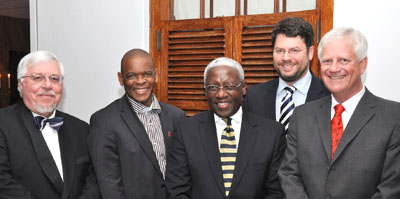Latest News Archive
Please select Category, Year, and then Month to display items
12 October 2020
|
Story Arina Engelbrecht
|
Photo Supplied
 Arina Engelbrecht from Organisational Development and Employee Well-being believes physical activity has a number of benefits for one’s health, including stress relief.
Arina Engelbrecht from Organisational Development and Employee Well-being believes physical activity has a number of benefits for one’s health, including stress relief.
Being physically active plays a big role in preventing the development of mental-health problems and in improving the quality of life of people experiencing mental-health problems.
Treatment for depression
Physical activity can be an alternative treatment for depression. It can be used as a stand-alone treatment or in combination with medication and/or psychological therapy. It promotes all kinds of changes in the brain, including neural growth, reduced inflammation, and new activity patterns are formed that promote feelings of calm and well-being. It releases endorphins – powerful chemicals in the brain that energise your spirit and make you feel good.
Physical activity can be very effective in relieving stress. Research in adults has found that physically active individuals tend to have lower stress levels compared to individuals who are less active. It also leads to improved sleep. When a person sleeps better and feels more rested, overall quality of life improves. They cope better with daily life stressors.
Reduce Alzheimer's risk
Regular physical activity can reduce your risk of developing Alzheimer's disease by up to 50%. It can also slow down further deterioration in those who have already started to develop cognitive problems. It stimulates the brain’s ability to maintain old connections as well as to make new ones.
A study asked people to rate their mood immediately after periods of physical activity (e.g. going for a walk/run, cycling, doing housework) and periods of inactivity (e.g. reading a book or watching television). Researchers found that participants felt more content, more awake, and calmer after being physically active compared to after periods of inactivity.
In conclusion, people who are physically active feel a sense of well-being, feel more energetic throughout the day, sleep better at night, have sharper memories, and feel more relaxed and positive about themselves and their lives.
“Being physically active not only changes your body, it changes your mind,
attitude, and your mood.” – Arina Engelbrecht
UFS informs judicial officers about human trafficking
2010-08-11
 |
At the conference on human trafficking for judicial officers were, from the left: Prof. Johan Henning, Dean of the Faculty of Law at the UFS; Mr Ace Magashule, Premier of the Free State; Chief Justice, Justice S Nqcobo; Mr Andries Nel, Deputy Minister of Justice and Constitutional Development; and Judge Faan Hancke, acting Judge President of the Free State.
Photo: Stephen Collett |
The Faculty of Law’s Centre for Judicial Excellence at the University of the Free State (UFS) in cooperation with the South African Chapter of the International Association of Women Judges (IAWJ) and the Department of Justice and Constitutional Development’s Gender Directorate hosted a conference for judicial officers from the Magistrate’s Courts, the Regional Courts and the High Courts on “Human trafficking: Equal rights, equal opportunities and progress for all”.
The Deputy Minister of Justice and Constitutional Development, Mr Andries Nel delivered a keynote address at this event. He said that anti-human trafficking legislation would be passed in the near future. Also delivering a key note address at the conference was the Chief Justice, Justice Sandile Nqcobo.
The aim of the conference was to empower judicial officers on the topic of human trafficking. A number of presentations from amongst others Adv. Beatri Kruger from the UFS’s Unit for Children’s Rights served to inform magistrates and judges about the characteristics, causes, the human trafficking process and the consequences of human trafficking on victims. Delegates also discussed the impact of human trafficking on human rights and the comprehensive response to human trafficking with a clear focus on the victims’ rights during criminal proceedings.
This conference was attended by 100 judicial officers from across South Africa.